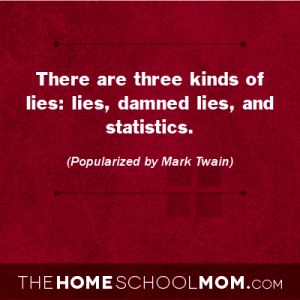You don't need a curriculum to teach kids to understand statistics for fact-checking research or stories in the media or for consumer use.
One of my favorite "instead of curriculum" titles is the book Damned Lies and Statistics: Untangling Numbers from the Media, Politicians, and Activists (affiliate link) by Joel Best.
This book is a great book for your high schooler to read. While it can be paired with a traditional study of statistics, it also works well on its own for kids who need to understand statistics from either a consumer point of view or for fact-checking research or stories in the media.
The author demonstrates how statistics can be manipulated to "prove" certain assertions. He explains how bad numbers (incorrect statistic) come about in the first place, and then how they get echoed in scholarly papers and the media until they begin to be accepted as facts.
He discusses how some mistakes with statistics are born from misunderstanding how statistical analyses work, and others are developed to be intentionally misleading.
Best's engaging style mixes anecdotes with solid explanations of statistical concepts -- though he's not teaching students how to calculate statistics. I find that what he is teaching is more valuable for many people -- which is an understanding of statistics. That's because if you understand the limits of certain statistics, you can't be manipulated into believing things that the statistics don't actually prove.
His concepts work best with statistics involving social science, which means he has a lot of value to contribute to us generalists, who may be reading and thinking about everything from elections to business to education to the environment.
In fact, if you read Best's book with your child, you'll probably find yourself doing a lot of inquiry-based education. You'll soon be discussing current events with your son or daughter with one eye on the statistics that frequently accompany news stories.
Understanding Best's points about the manipulative power of statistics gives homeschoolers another tool for critical thinking. Today, one of my sons spotted an inconsistency in a news story about the number and percentage of boys enrolled in school who are taking medication for ADD. After asking "which is it?", he took a further look at whether the statistics were accurate and what point of view they reinforced.
Learning to ask these kinds of questions about what we read means we are harder to fool. We'll be better consumers, more informed voters, and better at analyzing research that we use for work or other classes. We might even be healthier, since understanding statistics can help us analyze the health claims for certain foods or medications.
As Best says:
. . . Critical (people) approach statistics thoughtfully; they avoid the extremes of both naive acceptance and cynical rejection of the numbers they encounter. Instead, the critical attempt to evaluate numbers, to distinguish between good statistics and bad statistics. (page 166)
Best suggests an approach for doing just that -- distinguishing between good and bad statistics.
Combined with a good book on fallacious reasoning, such as The Fallacy Detective, Damned Lies and Statistics will help your child develop a healthy skepticism of poorly presented arguments.
Being able to identify when statistics have been abused or manipulated is not only a life skill, but an academic skill. Understanding the material in Damned Lies and Statistics is good preparation for writing persuasive and informative compositions in college, as well as participating in debates or discussions in the college classroom.




 A popular speaker at homeschooling conferences, business groups, and parents’ groups, Jeanne Potts Faulconer homeschooled her three sons in North Carolina, Mississippi, and Virginia for twenty years. Holding her Master of Arts degree in Communication, Jeanne conducted portfolio evaluations for Virginia homeschoolers for evidence of progress for many years. Jeanne is a former college faculty member, former editor for several publications, news correspondent for WCVE, and former director of Brave Learner Home. She is the contributing editor for TheHomeSchoolMom newsletter and writes the popular Ask Jeanne column addressing homeschool parents' questions here at TheHomeSchoolMom.
A popular speaker at homeschooling conferences, business groups, and parents’ groups, Jeanne Potts Faulconer homeschooled her three sons in North Carolina, Mississippi, and Virginia for twenty years. Holding her Master of Arts degree in Communication, Jeanne conducted portfolio evaluations for Virginia homeschoolers for evidence of progress for many years. Jeanne is a former college faculty member, former editor for several publications, news correspondent for WCVE, and former director of Brave Learner Home. She is the contributing editor for TheHomeSchoolMom newsletter and writes the popular Ask Jeanne column addressing homeschool parents' questions here at TheHomeSchoolMom.
Leave a Reply